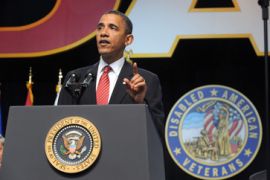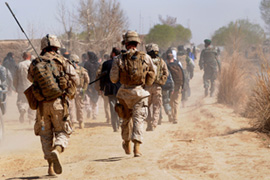Obama defends his ‘good war’
But no matter how vigorous his PR offensive, a change in Afghanistan policy seems likely.

 |
| Barack Obama again stressed the connection between the war Afghanistan and the imperative to defeat al-Qaeda while talking to a war veterans group this week [EPA] |
It is the nature of politicians to take credit for whatever they can when things go well, and to avoid blame as much as possible when things do not. This week the administration of Barack Obama, the US president, has worked hard to do both in the context of Iraq and Afghanistan, but in so doing, it may be further entangling itself in a trap of its own making.
In Atlanta on Monday, Obama was not shy in taking credit for claimed successes in Iraq. The successes he chose to stress, however, were telling. They in fact had little to do with Iraq itself, but rather more with the fidelity his administration has shown in meeting its timetable for the withdrawal of US forces, and for bringing the US military engagement there to a “responsible end”.
There is more than a little irony in the sight of Obama taking credit for the results of a redoubled US effort in Iraq which he actively opposed as a senator and as a presidential candidate.
That irony is compounded by the president’s current stress on the US’ ongoing transition from a military-led effort in Iraq to a civilian effort dominated by diplomats, when the pervasive complaint heard from many key figures across the political spectrum in Iraq has to do precisely with a lack of diplomatic engagement from the US.
Iraq has been in post-election political gridlock for four months now, unable to form a government or even to convene its parliament, while looking in vain for some sign of political energy or imagination from its US partner to help break the impasse.
Similarly, the current US administration has shown little attention to the need to negotiate the details of a Strategic Framework Agreement called for between Iraq and the US, despite the importance of such an agreement in setting the tone and expectations for the US’ future engagement with Iraq – and despite the recent US investment in Iraq of over 4,400 troops killed, over 31,500 wounded, and nearly $1 trillion spent.
‘War of choice’
 |
| After coming to power, Obama wasted no time in making the war in Afghanistan his own [EPA] |
Instead, the success in Iraq touted by the US president now is the withdrawal of 90,000 troops, with the promise of more to come by the end of 2011. “The message is that when the president makes a commitment, he keeps it,” as the White House deputy press secretary proclaimed.
Obama should be wary of a focus on commitments, however, as this could ultimately prove unhelpful where Afghanistan is concerned. For as much as the Iraq war was, in candidate Obama’s telling, George Bush’s ill-considered and costly “war of choice,” the war in Afghanistan, in sharp contrast, was a comparatively under-resourced “war of necessity”.
Once president, Obama wasted no time in making this “good war” his own, launching a full policy review and then announcing a new and highly ambitious Afghan nation-building strategy with appropriate fanfare in March, 2009.
At that time, President Obama differentiated himself from his predecessor not by the greater modesty of his aims – he adopted all of the ambitious goals tacitly set by the Bush White House in Afghanistan – but by his commitment to resource the effort adequately for success.
That “commitment,” however, was dealt a severe blow when the extent of the resources required to fulfill it began to come into clearer focus. Informed by his then-newly-arrived commander in Afghanistan, General Stanley McChrystal, that some 40,000 additional troops, over-and-above the 21,000 Obama had already added to the Bush administration’s total, would be required just for a chance of success, the president demanded yet another policy review.
He emerged several months later with distinctly less ardour for an open-ended exercise in Afghan nation-building and a timetable for the start, at least, of a US withdrawal.
The al-Qaeda link
| IN depth | |||||||||||||||||||||||||||||||||||||||||
|
Obama has always been careful to tie the US effort in Afghanistan to the over-arching imperative to “disrupt, dismantle, and defeat” al-Qaeda, the organisation responsible for the 9/11 attacks and still clearly committed to a campaign against the US and the West.
That tie-in was again very much on display in Atlanta this week, as the president spoke before a war veterans group. The effort against the Taliban, he indicated, was fully justified, for “if Afghanistan were to be engulfed by an even wider insurgency, al-Qaeda and its terrorist affiliates would have even more space to plan their next attacks. As president of the United States, I refuse to let that happen”.
He went on: “In this region and beyond, we will tolerate no safe haven for al-Qaeda and their extremist allies.”
For the time being, the president is clinging on principle to the need to confront al-Qaeda, and justifying the sacrifices associated with a problematic – some would say failing – counterinsurgency effort in Afghanistan on that basis.
However, having rejected in his last policy review a less far-reaching approach in Afghanistan, one focused much more precisely on counter-terrorism aims, and advocated by his own vice-president, no less, Obama is going to have difficulty justifying the broad counter-insurgency effort currently underway unless his new commander, General David Petraeus, is able to produce a clear turn-around, and quickly.
For all that Obama continues to assert that his campaign in Afghanistan is “focused on goals that are clear and achievable,” it seems that a rapidly-developing majority in his own party is becoming convinced that his goals there are neither.
It is hard to see how the president is going to avoid an abrupt change in policy between now and his self-imposed deadline of next summer, no matter how vigorously he pursues his current PR campaign in defence of the current one.
Robert Grenier was the CIA’s chief of station in Islamabad, Pakistan, from 1999 to 2002. He was also the director of the CIA’s counter-terrorism centre.
The views expressed in this article are the author’s own and do not necessarily reflect Al Jazeera’s editorial policy.